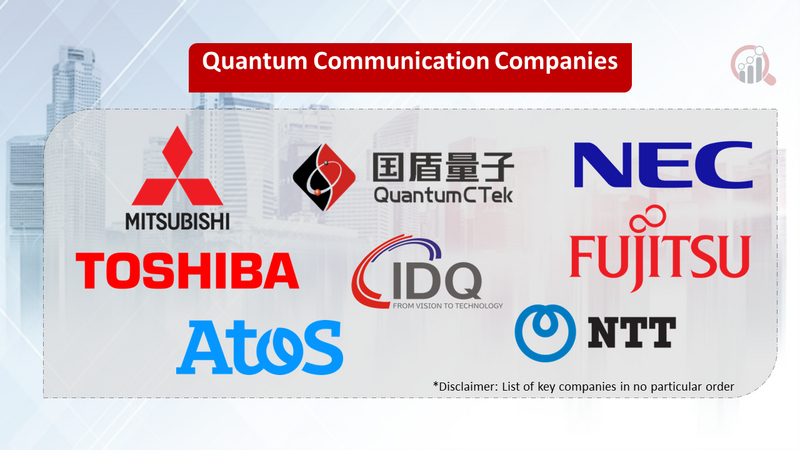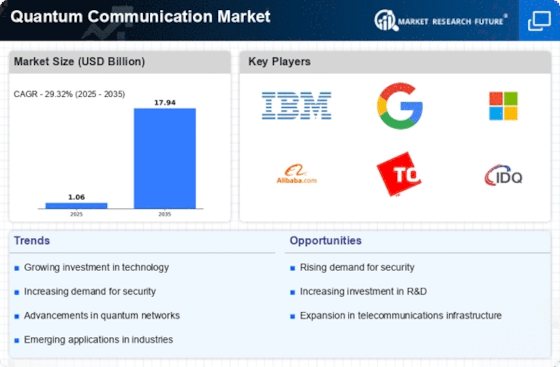Top Industry Leaders in the Quantum Communication Market

The Quantum Communication Landscape: A Tussle for Future-Proof Security
The world of data transmission stands on the precipice of a paradigm shift with the emergence of quantum communication. This revolutionary technology leverages the bizarre principles of quantum mechanics to usher in an era of unbreakable encryption, immune to the ever-evolving threats of classical cryptography. As a result, the competitive landscape in this nascent market is fiercely dynamic, with established tech giants, startups, and research institutions battling for a foothold in this potentially lucrative and impactful domain.
Key Players:
-
AmberFlux
-
ATandT
-
Aliyun (Alibaba Cloud)
-
Atos
-
Fujitsu
-
Huawei Noah's Ark Lab
-
ID Quantique
-
MagiQ
-
Mitsubishi
-
NEC Corporation
-
NTT Laboratories
-
Raytheon/BBN
-
Toshiba
-
Quantumctek Co, Ltd
Strategies Adopted:
-
Partnerships and Collaborations: Recognizing the fragmented nature of the ecosystem, key players are actively forging partnerships with telecom companies, government agencies, and financial institutions. This collaborative approach fosters knowledge sharing, accelerates research and development, and facilitates real-world deployments of quantum communication networks.
-
Cloud-based Platforms: To democratize access to quantum communication resources, tech giants like Microsoft and Huawei are offering cloud-based platforms that allow users to integrate secure QKD protocols into their existing networks without expensive on-premise infrastructure investments.
-
Standardization and Regulations: Establishing industry-wide standards and regulations is crucial for ensuring interoperability and driving widespread adoption. Organizations like NIST and the International Telecommunication Union (ITU) are actively working on developing standardized protocols and security practices for quantum communication networks.
-
Investment in Hardware and Software: Continuous advancements in qubit technology, encryption algorithms, and network security protocols are essential for sustained market growth. Companies are heavily investing in research and development to improve the performance, scalability, and security of their quantum communication technologies.
Factors for Market Share Analysis:
-
Technology Capabilities: The type of QKD protocol used, transmission distance achievable, and encryption strength offered are critical factors that determine the competitiveness of a solution. Companies with superior technology capabilities are likely to gain a market edge.
-
Network Infrastructure and Coverage: Robust fiber optic networks or reliable satellite constellations are essential for building large-scale quantum communication infrastructure. Companies with established deployments or ambitious expansion plans have an advantage.
-
Industry Partnerships and Collaborations: Strong partnerships with key stakeholders like telecom providers and secure data users provide companies with access to valuable channels and potential customers.
-
Regulatory Landscape and Compliance: Adapting to evolving regulations and security standards is crucial for market access. Companies with a proven track record of compliance have a head start.
New and Emerging Companies:
Several new players are emerging in the quantum communication market, bringing fresh perspectives and innovative approaches. Some notable examples include:
-
QuTech: A Dutch research institute developing hybrid classical-quantum communication protocols for ultra-secure internet connections.
-
QxBranch: A US-based startup specializing in chip-based QKD solutions for securing mobile networks and edge computing deployments.
-
Starlink: Elon Musk's satellite network venture is exploring integrating QKD functionalities into its constellation, enabling secure global communication in remote areas.
Current Company Investment Trends:
-
Focus on Secure Networking Infrastructure: Building comprehensive fiber optic networks or investing in satellite-based QKD constellations is a major focus area for leading players like Huawei and ID Quantique.
-
Financial Services and Government Agencies: Banks, financial institutions, and government agencies are early adopters of quantum communication due to their critical need for secure data transmissions. Companies are tailoring their solutions to cater to these specific sectors.
-
Cloud-based Quantum-as-a-Service (QaaS): Providing QKD capabilities as a cloud-based service is gaining traction, with Microsoft and Huawei leading the charge. This approach allows for flexible and cost-effective adoption of quantum communication technologies.
-
Quantum-resistant Algorithms and Cryptography: As traditional cryptography faces potential threats from quantum computers, companies are actively developing quantum-resistant
Latest Company Updates:
IBM and AT&T Partner for Secure Quantum Network in US:
On December 15th, 2023, IBM and AT&T announced a collaboration to build the first commercial quantum network in the US. This network will connect key AT&T facilities across New York, Boston, and Washington DC, providing secure data transmission for financial services, healthcare, and government agencies.
China Launches First Quantum Satellite Constellation:
On November 10th, 2023, China successfully launched its first quantum satellite constellation, marking a significant milestone in its quest for secure global communication. This network aims to provide unbreakable encryption for military and commercial applications.
Microsoft Launches Azure Quantum QKD Service:
On May 12th, 2023, Microsoft announced the launch of its Azure Quantum QKD service, providing cloud-based access to QKD functionalities for secure data transmission within its Azure cloud platform. This move makes QKD technology more accessible to a wider range of users.










